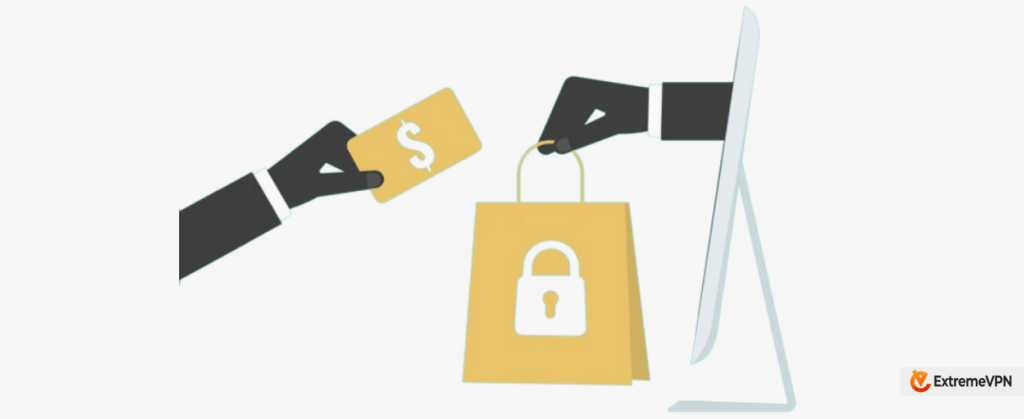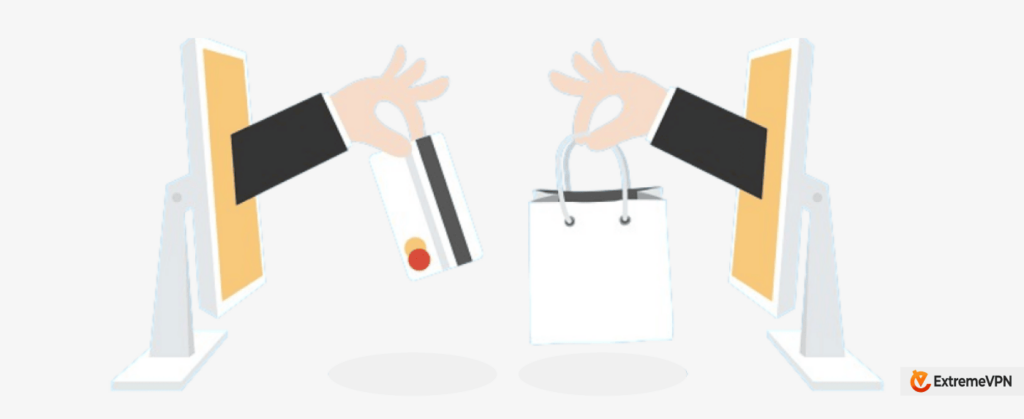Hackers and other malicious individuals are always on the run to steal your sensitive information. For this reason, you must emphasize your privacy and security when shopping online.
This article will explain some major tips for shopping online that will help you avoid risks. It will benefit you both in-store and online. They will also assist you in making decisions and decreasing the possibility of fraud.
Safety Tips for Online Shopping – Quick List
In a hurry? Here’s a quick rundown of some of the best tips for online shopping.
- Cover webcam: You may maintain anonymity by physically enclosing the webcam. You may manage the webcam’s capabilities as well.
- Avoid unsecured sites: Websites with “https://” within their URL are more unsafe than those without. Stay away from these websites to protect your attention from information theft.
- Keep accounts safe: While utilizing a public system, avoid signing in. It will stop unauthorized users from accessing our devices.
- Use end-to-end encrypted apps: Be discreet in your communications. You may protect your online interactions by utilizing applications containing E2E encryption.
- Ignore suspicious emails: It is best to disregard emails sent to you by an unknown source. It aids in preventing file downloads and dubious link clicks.
- Manage cookies: Constantly delete browser history and cookies. As a consequence, fewer websites can obtain your data.
- Enable two-factor authentication: Enabling 2FA increases security. You receive a second OTP to access your account.
- Use strong passwords: For the best privacy, using secure passwords might be beneficial. It will block unauthorized access.
- Don’t open untrusted links: Never click on links you get from sources that are not trustworthy. They try to steal your information or bring you to unsafe locations.
- Use a VPN: A VPN encrypts your connection to the internet. It is a great technique to keep yourself secure online and perform tasks.
- Log out of all websites: Ensure you log out before utilizing an accessible gadget or network. It’ll maintain a safe atmosphere. It guarantees that you’ll keep your data secure from access without authorization.
- Lock screens: Use biometrics, PINs, and reliable passwords. It stops unauthorized interference with the gadget you’re using.
Safety Tips for Online Shopping – Detailed List

1. Cover Webcam
Keeping your camera hidden is essential for your security and confidentiality. A camera is a device for recording conversations and gatherings. Hackers can potentially misuse your cell phone if they get access to it. They might employ viruses or tools for remote access to get into your camera.
However, you can prevent someone from wirelessly activating a webcam by hiding it. You can use tape, stickers, or a particular cover for this purpose.
A cover is a protective barrier between the hacker and your device, ultimately stopping the fraud. It also protects you against zero-day attacks. Because of this basic safety precaution, you may feel confident knowing you are safe.
2. Avoid Unsecured Sites
Criminals can quickly steal personal information by accessing an unsecured “http://” website. Hence, it’s essential to protect your private information, such as credit card details. If leaked, you could run into phishing attacks. We advise you to always use safe websites instead of unsecured ones to prevent becoming an easy target.
Whenever you visit a platform, be sure the URL begins with “https://.” Verify the internet site is safe before entering any financial or private data. Also check for the padlock symbol in the browser’s URL bar.
3. Keep Accounts Safe
Avoid the use of open networks or gadgets to access your accounts. Internet connections at libraries, coffee shops, and airports are usually faulty, and hackers and eavesdropping tools can easily modify them.
Because of this reason, you should always keep your gadgets secure and use safe networking. To maintain the security of your accounts, you may continue doing this. When you’re away from home, consider using your mobile data or a secure network connection to access the internet; avoid public Wifi at all costs.
4. Use End-to-End Encrypted Apps
Always use end-to-end encrypted messaging platforms. E2EE is a dependable protection mechanism that secures all your messages before they reach the receiver.
This way, no outsider can read or decode the messages except that of the receiver. This method guarantees the user’s privacy and shields them.
Using reliable communication programs with a successful track record is essential. Verify that end-to-end encryption is an option in every program you use or may have used in the past.
5. Ignore Suspicious Emails
The very noticeable thing is to ignore shady emails while conducting online transactions. Emails are regularly used by cybercriminals as their primary scamming technique. If clicked, users can engage in unnatural links or download malicious files, revealing their private data. However, you can avoid being a victim if you don’t respond to these emails.
In addition, it’s important to avoid transmitting private or sensitive data. You are not supposed to do anything, yet it comes from a trustworthy source. Reputable companies never ask for private data over email. Rather, continue cautiously and use alternative methods to confirm the email’s veracity. Report to your service provider if you receive suspicious emails. It will protect users against such fraud.
6. Manage Cookies
Managing cookies is an essential security precaution. It safeguards your privacy and regulates the data that websites gather about you. Cookies are small text files that websites you visit place on your machine’s hard drive. Yet they support data gathering, security abuses, and monitoring of internet behavior.
You may restrict the amount of data that websites gather. Modern web browsers allow blocking or deletion of cookies. It reduces the likelihood of illegal monitoring. By controlling your cookies, you may achieve an equilibrium in security.
7. Enable Two-factor Authentication
You should constantly activate two-factor authentication (2FA) as a security measure. As a consequence, your online accounts are safer. 2FA requires a different authentication mechanism. This means that a special code or verification arrives on your cell phone whenever you try to log in. It raises the bar for safe online shopping.
By doing this, you make sure that regardless of whether somebody discovers your username and password, they still need to be able to use the device you’re using.
8. Use Strong Passwords
Confirm that each of your account uses a unique and secure password. A safe password is difficult for outsiders to guess and to safeguard your online accounts. It usually includes letters in both upper and lowercase, numbers, and special characters.
Strong passwords help protect your accounts against a variety of dangers. For example, a brute-force assault, whereby software programs try to figure out your username and password.
Also, consider using a trusted password organizer to manage credentials. It eliminates the need to remember them all. Password managers create and preserve passwords.
9. Don’t Open Untrusted Links
Don’t rely on or click on any questionable link. Through these links, hackers could infect your machine with malware or con you into disclosing confidential data. Users could receive these URLs through junk mail, networking sites, or malicious websites.
Do not click on these pages to lessen your vulnerability to several frauds. Before interacting, it is crucial to confirm their dependability and authenticity. Check whether it has legitimate sources, secure connections (https://), and official domain names. Carrying out these steps will ensure the security of your data.
10. Use a VPN
A VPN encrypts your internet traffic and creates a safe connection between your device and the server you connect to. A VPN is crucial when you connect to free wireless networks (i.e., public Wifi).
With a VPN, you can conceal your online activities from prying eyes (including the government, Internet service providers, and hackers). It secures your private information from unauthorized access, i.e., your passwords, financial information, or browser history.
A VPN masks your IP address and replaces it with a new one. This way, you seem to be checking in from a different location, and you can access geo-blocked websites or content from anywhere.
Looking for the best VPN service? ExtremeVPN is the finest option available. We provide great privacy options that help you stay anonymous while using the internet.
11. Log Out of All Websites
You must log out of every website you use after using it for internet security reasons. This way, your existing session will expire, and access to the website will be temporarily stopped. It reduces the possibility that somebody else could have access to the data on the account you’re using.
When utilizing shared gadgets, log off of websites. Keyloggers are devices or malware that may be more likely to be present in compromised situations. Each session ought to be followed by a logout.
12. Lock Screens
Lock screen, whether on a computer or tablet, can be used to identify a username and password, PIN, pattern, or biometric device.
By encrypting your screens, you can be sure that only people with permission will have access to the data. Therefore, it’s crucial to set up your lock screen, whether between other people or in the open.
A keypad adds a layer of safety against unauthorized use of your device and guards against accidental activities that could happen when the device isn’t in use.
How to Protect Yourself When Shopping Online

Here’s how you can keep yourself safe when buying something online:
- Shop from reputable websites. Shopping from reliable online retailers is the best way to protect you from fraud. If you don’t know how to find one, you can always read the website’s reviews and ratings. They will help you choose one.
- Be aware of phishing attempts. Make sure you steer clear of websites, messages, or emails that ask about your confidential or financial information. These sources may look reliable, yet they only want to exploit your data.
- Keep your devices secure. Get a VPN like ExtremeVPN and hide your activities online when shopping. Plus, you should install an antivirus so that you don’t get any malicious software installed on your device.
- Update your applications. Keeping your security software updated on all your gadgets is essential to avert possible attacks and maintain your safety.
- Read the website’s privacy policy. Before making a purchase, take a few moments to review the vendor’s privacy policy. By doing so, you will know how to manage your data to the best of your ability. Ensure your details will remain confidential and not be shared with anyone else.
- Use secure payment methods. Use secure payment options such as credit cards. You can use these approaches to avoid unauthorized transactions and fraud. Avoid utilizing debit cards or direct bank transfers while making internet purchases. They may not provide the required level of security.
